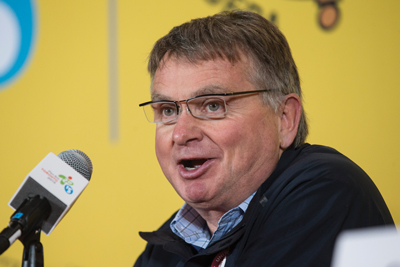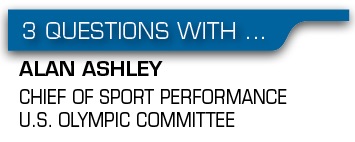Editor’s note: This story is revised from the print edition.
Alan Ashley is the U.S. Olympic Committee’s top athletics executive, overseeing a department dedicated to maximizing the American medal count. Prior to 2006, he held a similar role at the U.S. Ski and Snowboard Association. He spoke with staff writer Ben Fischer last week during the USOC Media Summit in Los Angeles.
■Athletes are training for the Olympic trials and Rio, but what’s your job right now?
ASHLEY: Our whole responsibility is to put services and resources in the hands of NGBs and their athletes. So what I’m looking at right now is making sure that everything we’ve committed to, we’re delivering on, whether it’s science, medicine, financial support. And that we’re asking a lot of questions and we are very involved in that last prep, to make sure that if there’s anything athletes and coaches see that can be done better, we do them better together.
So really it’s follow through at this point, and then seeing if we can pick up any last-minute projects or programs that might service the athletes.
■The USOC is in a much better financial position than in the past. How has that changed your job?
 |
Alan Ashley says the USOC's improved finances have allowed for more flexibility in working with each sport.
Photo by: GETTY IMAGES |
ASHLEY: The consistency of the support is much different. You’re not really worried about big fluctuations in your ability to support the NGBs and the athletes, that’s one. Two, we feel like we can be a little more nimble, and a little more flexible, in terms of how we work with each sport.
The thing I love is when the sport comes forward, and says, “We need something.” A great example is the covered velodrome in Colorado Springs. It was something where the track cyclists said, “If we could ride year-round at altitude, that’d be a huge deal for us.” So by having a strong business organization, we were able to react to that, put the cover in, and the girls just won a gold medal at the world championships.
■Rio’s happening, but your life continues on. What are you doing to prepare for 2018 and 2020?
ASHLEY: I just got back from Asia. We’re in the process — we’re very deep into 2018. I actually have a small group within my department that only focuses on Winter Games. We’re working with the winter sports to design their detailed plans of when they want to come in, where they want to compete, where they’re going to stay, how we’re going to take care of extra officials. It’s really important to be out ahead of this, because there’s always a limitation on resources, and the closer you get to a Games, the more expensive it is to secure housing, secure facilities, those sorts of things.
We’re very focused on that sort of thing, and frankly, the same kind of thing in Tokyo. We actually signed an agreement with a prefecture in Tokyo called Setagaya City, which is a really great training venue for us because it’s got lots of different options and ways to support sports, and it’s about 20 minutes away from the Olympic Park and the Village. We have an agreement with them, and they’re excited and we’re excited.





